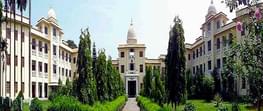Since 2016, college admissions require an entrance test, while Master's courses have their own separate tests. The university employs around 60 faculty members, including the principal, across various departments, with a total staff of about 90. Some departments need more faculty, but the current staff is noted for being supportive, especially in guiding PhD students. Academically, the university operates on a structure of four semesters a year. The fee structure is designed to be affordable, with undergraduate courses costing 140,000 INR for the first three years.
For Master's degrees, science courses have a fee of approximately 3,500 INR, while arts courses cost around 2,500 INR, reflecting the absence of lab sessions in arts. Despite the lack of a formal placement cell, job placement is facilitated through alumni and faculty support, particularly benefiting high-achieving students in fields like healthcare and education. Internships are not officially provided but can be pursued independently. The infrastructure supports careers in prestigious sectors, such as railways.
A variety of scholarships, including government-funded ones like SVMCM, minority scholarships, Inspire, UGC, and CSIR, as well as university-specific scholarships, are available to students performing well academically. While the fee structure is semester-based, graduation costs about 30,000 INR, with students reporting various fees, including tuition fees at 5,000 INR per month and additional costs for admission, lab, and registration. Scholarships can significantly offset these costs, as evidenced by a student receiving a one-time scholarship of 18,000 INR.
Overall, the university provides a supportive environment for students from diverse economic backgrounds, with accessible fees and numerous opportunities for job placements and scholarships.










![National institute of Biomedical Genomics - [NIBMG]](https://image-static.collegedunia.com/public/college_data/images/appImage/16739_bio_new.jpg?h=111.44&w=263&mode=stretch)

![Maulana Abul Kalam Azad University of Technology - [MAKAUT]](https://image-static.collegedunia.com/public/college_data/images/appImage/1703077207b3d0ae6e217f4921a7126b177858a566.jpg?h=111.44&w=263&mode=stretch)

![Ramakrishna Mission Vivekananda Centenary College Rahara - [RKMVCC]](https://image-static.collegedunia.com/public/college_data/images/appImage/1487569899AppNew.jpg?h=111.44&w=263&mode=stretch)



![Ramakrishna Mission Residential College - [RKMRC]](https://image-static.collegedunia.com/public/college_data/images/appImage/1487571033asdc.jpg?h=111.44&w=263&mode=stretch)









![Directorate of Open and Distance Learning, University of Kalyani - [DODL]](https://image-static.collegedunia.com/public/college_data/images/logos/1535520405Distancelogo1.jpg?h=72&w=72&mode=stretch)






![Barrackpore Rastraguru Surendranath College - [BRSNC]](https://image-static.collegedunia.com/public/college_data/images/logos/14882002061393062060BarrackporeRastraguruSurendranathCollege.png?h=72&w=72&mode=stretch)
![Asansol Girls College - [AGC]](https://image-static.collegedunia.com/public/college_data/images/logos/1488189477logo.png?h=72&w=72&mode=stretch)




![Ananda Mohan College - [AMC]](https://image-static.collegedunia.com/public/college_data/images/logos/1488175275logo.png?h=72&w=72&mode=stretch)




![Brahmananda Keshab Chandra College - [BKCC]](https://image-static.collegedunia.com/public/college_data/images/logos/1487930389a.jpg?h=72&w=72&mode=stretch)
![Indian Statistical Institute - [ISI]](https://image-static.collegedunia.com/public/college_data/images/logos/1426847245logo.jpg?h=72&w=72&mode=stretch)
![National institute of Biomedical Genomics - [NIBMG]](https://image-static.collegedunia.com/public/college_data/images/logos/col16739.jpg?h=72&w=72&mode=stretch)



Comments